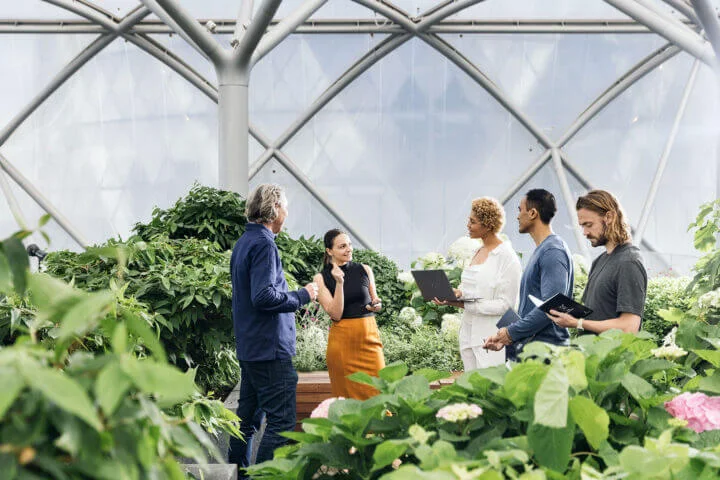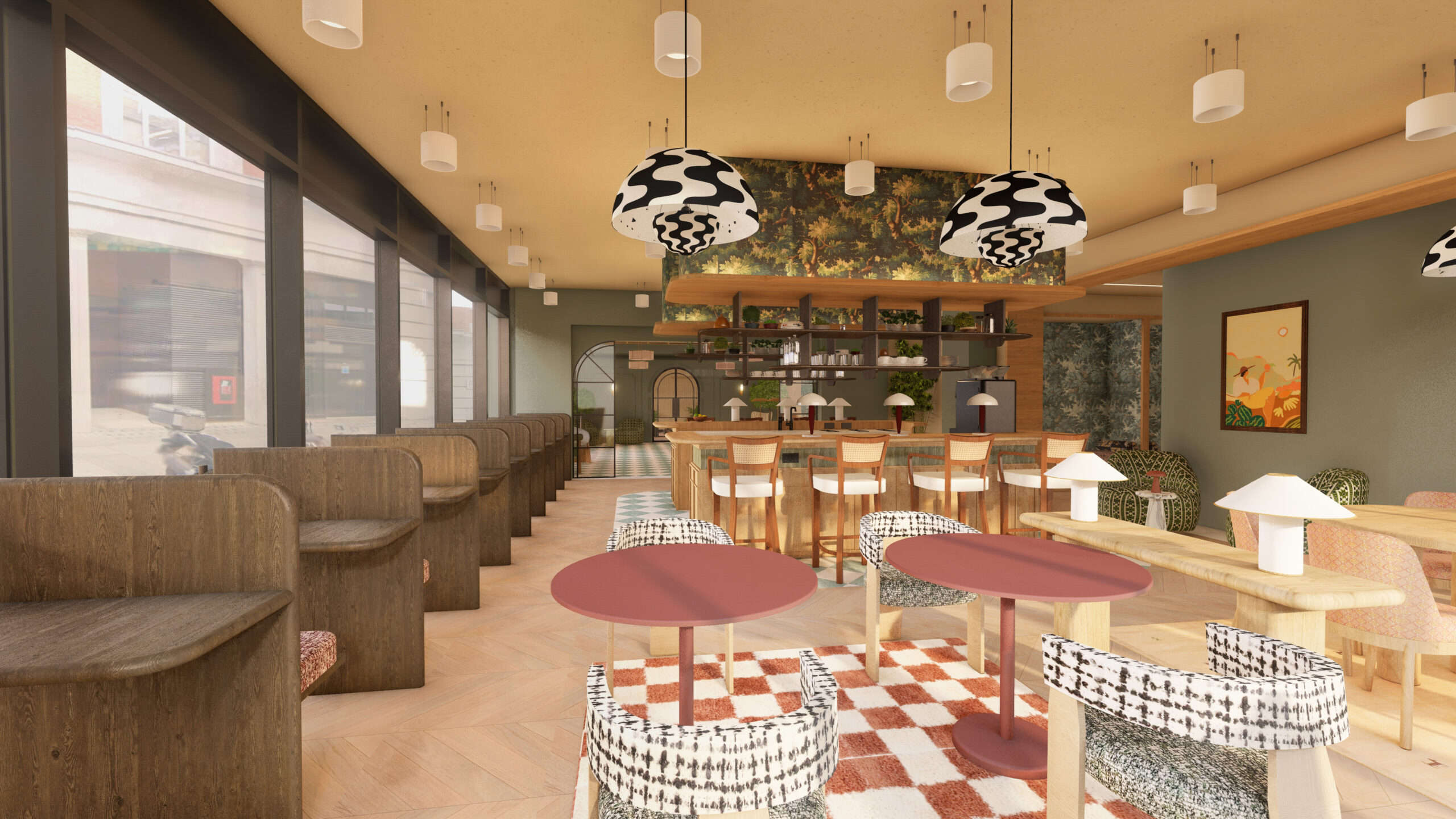Sustainable Switches for a Greener Working World
24th February 2022

As the last of the UK’s coronavirus restrictions come to an end, we can finally prepare to get on with our lives as ‘normal.’ But two years of restrictions and three lockdowns later, we are now tasked with creating a future that draws from the best habits of our past lives before and during the pandemic. The way we shop, communicate with others, and spend our working day will look different now and with that, it’s likely our attitudes about how we impact the world around us will evolve as well.
We all remember the images from the early days of the first lockdown that circulated showing clearer waters at the UK’s beaches and rivers, as well as less smoggy skies above some of the world’s largest cities. These images sparked a conversation about the impacts of our everyday activities on the environment and got us all thinking a bit more about our individual contributions.
But as life resumes without restriction, what toll will that take on the world around us? Will a return to normal set us back in our journey towards sustainability, or has this time made us more conscious of our habits? How can we ensure that more climate conscious behaviours become a normal part of the future we are creating now?
The Home vs. Office Debate And Sustainability
One of the biggest changes post-pandemic will be our ways of working. Pre-pandemic, most UK professionals worked in offices full time. During the pandemic, that shifted to fully remote and gradually became a mix of both. It appears we will continue that way in our next chapter, and accepting this reality enables us to assess what this might mean for the climate crisis and to prepare accordingly.
Remote working has been proven to benefit the environment, leading many to believe that this is the ‘greener’ option. The main pro to remote models is that they reduce road traffic and its accompanying emissions pollution. Researchers found that during the UK’s lockdowns in 2020, Nitrogen Dioxide (NO2) levels in London were much lower than business-as-usual levels, reaching as much as a 40% decrease in May 2020. Workers spending their day at home also tend to create less waste from single-use plastics and disposable items. Instead of grabbing a coffee from a café on the way to work or grabbing lunch on the go, these individuals will make their own coffee served in washable mugs and cook at home, cutting down the amount of packaging they dispose of daily. At home, we also use less paper as documents are distributed virtually via email and collaborative platforms, we take virtual meeting notes, and so on.
But remote work isn’t a cure-all, especially not when we factor in the current energy crisis. When working at home, we each individually contribute to the climate. Everyone’s footprint will look different based on their individual habits and even the type of dwelling they reside in. For example, research has found that detached homes emit twice as much carbon as flats. Additionally, someone who lives in a modern, well insulated home will need to use less energy than someone living in an older home that lacks good temperature controls. Unfortunately, most UK homes are older especially outside of major cities, meaning that the savings from a lack of commute into an urban area is offset by an increase in individual home energy use.
The office helps to collectivise our environmental impact by enabling individuals to share resources that will be used anyways. Office buildings will be powered regardless of who is in them on any given day, so these buildings will contribute their own footprint regardless of whether we are remote or not. By going into the office, we are sharing those resources rather than using our own at home. In urban and suburban areas where commuting can be accomplished via public transit that will also run regardless, this can often work out to be the ‘greener’ option.
The reality is that one option is not inherently better than the other, as both the office-based and remote work have pros and cons when it comes to climate change. The best option is to combine the benefits of both and strive to make more sustainable choices day-to-day.
Creating Better Workday Habits
No individual can singlehandedly prevent climate change, but if we all work together to do our part each day, we can definitely make a difference! As we move towards hybrid working full-time, here are some small changes you can make during your in-office days to help make the most of them:
• Commute smarter: To help reap the benefits of less commuting traffic even on your in-office days, switch out your car for public transit whenever possible, though we understand that this might be easier for those living in better-connected areas. Landmark’s centres are well-located all over London and the regions, meaning that no matter where you live it’s likely we aren’t too far away! All of our centres boast excellent transport links, helping to maximise that your public transit options. Located near the office? Instead of grabbing a bus or the tube, why not switch to walking or cycling on the days where weather permits! We’ve got a place for you to store your bike once you get here.
• Reuse What You Can: We love our morning brew as much as anyone, but we can all definitely do better! Instead of grabbing a to-go cup from a café on your way, why not try a reusable travel mug? You can either fill it with your own drink from home, or ask your favourite café to fill it for you in lieu of a single-use cup. This helps to cut down the number of paper cups and plastic lids that are disposed each day. If you’re spending your in-office days at a Landmark centre, you’ll know we keep the hot drinks flowing all day long. If you plan to have more than one, consider reusing your ceramic mug. This helps reduce the water used to wash each mug every time you grab a clean one. Prefer to hydrate with H2O? Consider a reusable water bottle! We have places on site where you can refill yours throughout the day, cutting back on single use plastics.
• Prep and Pack: In the morning rush, the last thing you probably want to do is prepare a packed lunch at home. It can be tempting to grab something on the go, but often this leads to a lot of waste due to non-recyclable or unrecycled packaging being thrown in the bin. Bringing your own lunch from home in reusable containers can make a big difference in cutting down this waste over time. Taking a few minutes after dinner or before heading to bed the night before can help save time in the morning and make this switch easier to accomplish.
• Switch Off: Let’s be honest, office buildings are often lit up like a Christmas tree, even during sunny days. If working in a private office with windows or an area with lots of natural lighting, switch off your overhead lights and let daylight do its thing. To help cut down on our energy use in our centres, the lights in areas such as the toilets use automatic lights that operate on motion sensors so that these spaces are only lit when they need to be. But lights aren’t the only major energy sap in the office. If you use a desktop computer, make sure to shut it down at the end of the day rather than letting it sit in sleep mode all evening. That way, it isn’t using unnecessary energy overnight.
• Digitise Your Docs: Did you realise how much unnecessary printing you did until you began working remotely? Now that you are back in range of a printer, maybe think twice before putting that report to physical pages. By digitising your documents or only printing one version, you can help to cut back on the amount of paper that is used and wasted during an average day. Same goes for other office supplies. Now, we’re definitely not saying to not use the things you need! Just be a bit choosier. We’re doing the same on our end, working closely with our suppliers to help minimise the impacts the deliveries of these products have and cutting out steps in our supply chain wherever we can.
Again, none of us can reverse climate change overnight or alone. Bringing your lunch or using your mug twice instead of once is not going to stop the ice caps melting, the same way that eliminating a commute isn’t going to clean up the world’s air pollution. But if we all come together to make these small swaps, we can make an impact and work towards a more sustainable future. It won’t happen instantly, but if we develop the right habits now, they will become second nature and make a difference over time. The most important step is the first one.

